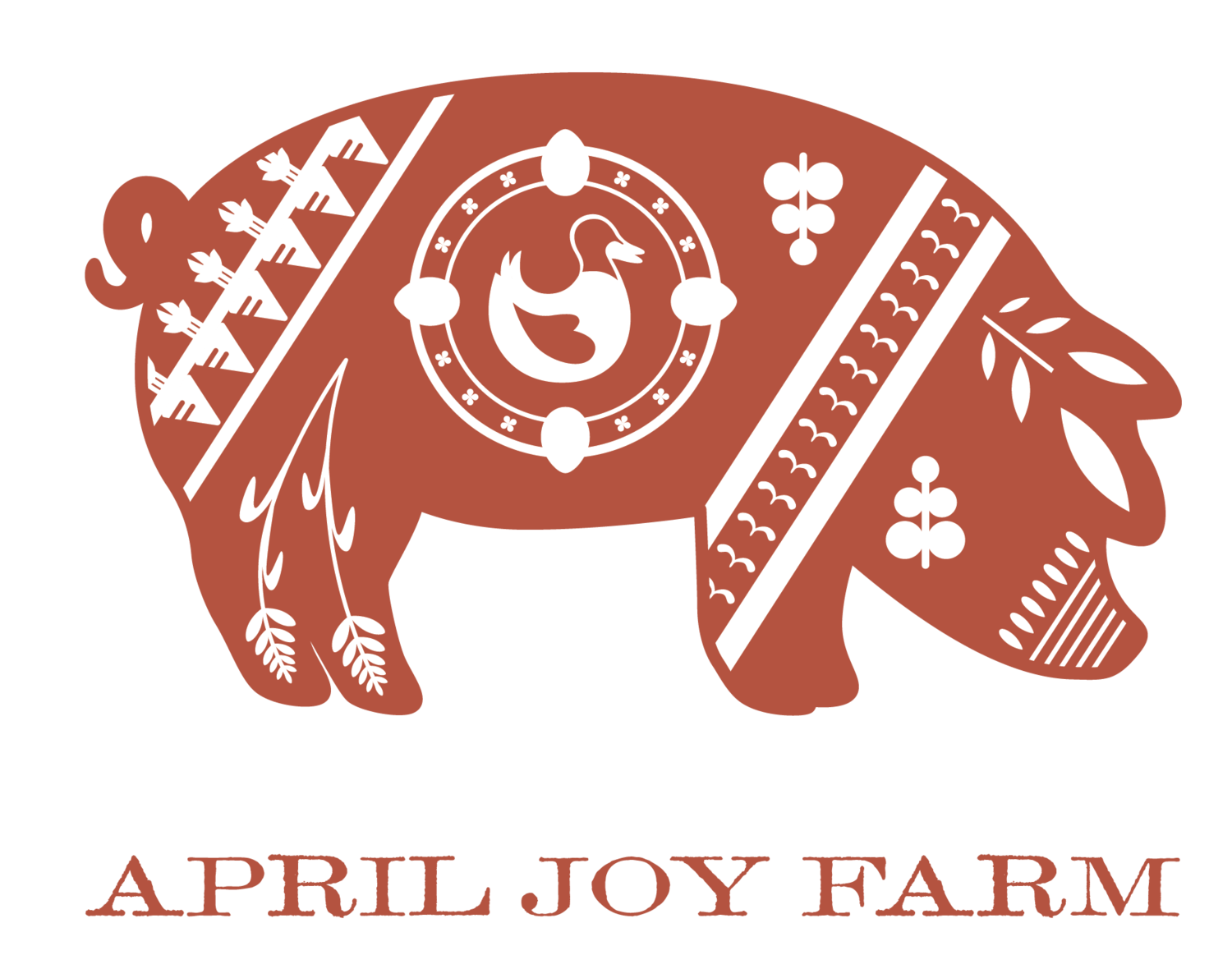Part II | What Does Organic Certification Mean for April Joy Farm?
Read Part I of the essay here.
Recently, there has been much discussion in the organic farming community about the National Organic Program. Many of us believe it doesn’t go far enough, especially in terms of the health and welfare of livestock. It’s very true that anytime anything is regulated, there will always be those who find a way to ‘beat the system’, to meet rule of law but not its intent.
Certainly, recent changes in the program standards, pushed forward by food manufacturing lobbyists, have attempted to erode the legal meaning of organic. For all of us producers who farm with integrity, this is beyond frustrating. Why do such corporations care about organics? Maybe it’s because the organic food sector is the fastest growing sector of the U.S. food industry. As I emphasized in my essay on stories as motivational kindling, language matters, and for good reason, the term organic definitely resonates with American families.
It’s important to emphasize small isn’t necessarily better or “more organic.” From my perspective, there are two types of certified organic products. The first are coming from producers who are proud and transparent about their practices, lead with their heart and are deeply concerned with the long term health of their community. Take for example, my sister Anna and her husband Doug. They are on a mission full of passion and purpose, and their certified organic operation is over 8,000 acres. By contrast, the second type of certified organic product comes from companies adhering to the bare minimum standards of what constitutes organic with the sole intention of making money. They probably aren't working very hard to reduce or eliminate chemical inputs, build soil health or provide a better living wage for their employees. They probably are making decisions based on short term financial profits, not the long term well being of our planet. Now don't get me wrong. I support and believe in the organic certification program. But I am also a fierce advocate of continuing to maintain legally stringent standards for producers AND for those who inspect our work. Our state organic inspection program is vital, because it takes a savvy shopper to assess intention when you can't drive by a producer's operation, or look that farmer in the eye. And as I detailed in part I of this essay, our certifying agency- Washington State Department of Agriculture- has always been a leader of organic integrity.
Two weeks ago we had our annual visit from the Washington State Department of Agriculture Organic Inspector.
After an extensive visit to the fields, Brad, the inspector and I checked out the compost structure. Then we walked by the low swale native shrub plantings and two humming beehives, stopped to see our pest management practices in the packing shed, and then collected labels from some soil amendments stored in the seeding house. Finally, we sat down on the farmhouse porch to review records and perform a series of audits. We never have any idea what specifically the inspector will want to audit, but at this point, they can ask to see any records that validate the reported sales and yields for the past 12 calendar months. For instance, he or she might say, "Show me an invoice from the 2nd week of October, 2018." On that invoice, I might have listed a certain variety of potato called 'Harvest Moon'. Then he or she will say, "Show me the harvest log which verifies the dates of harvest and total quantity of Harvest Moon potatoes you grew in 2018." Then, "Show me your records that identify the field and bed(s) in which you grew Harvest Moon potatoes, the total acreage devoted to that crop, as well as the record of what materials/amendments/fertilizers you applied to that acreage and when you applied them." Then, "Show me your total annual sales of Harvest Moon potatoes, and the records indicating your average yields." Then, "Show me the receipts for your seed purchases and documentation of your attempts to source certified organic seed." Get the idea?
Another hour later, our inspector closed his laptop and said, “Ok, time for our exit interview.” This is my twelfth year of certification, so I waited, pen in hand, ready to take notes on what procedures I would need to modify, change or refine. But then he paused, and looked Brad and I right in the eyes.
I put down my pen.
“You know, I’ve been doing this for fifteen years, and I have traveled all over the state, so you can bet I’ve seen a lot of farms. Visiting your farm is a tremendous pleasure. I can't believe the diversity of crops you are growing. The fact that you use virtually no pest or disease management inputs is incredible. And your recordkeeping is so good, you two could start a consulting business! Honestly, I just want to say thank you. It’s clear you both are deeply devoted to maintaining the highest standards of organic integrity.”
Now, I know our practices aren’t perfect. I know there are always going to be more ways we can improve. But boy, did that feel good.
April Joy Farm is farm # 1905—the 1,905th farm to be certified organic by WSDA. I am really proud to have maintained this third party, independent certification of our farm practices since 2007. Moreover, I’m proud that every season, my Organic Systems Plan includes more robust, diverse farming practices that push the boundaries of what organic integrity means. And truth be told, I’m especially tickled that year after year, two things keep getting shorter and shorter: the off-farm material inputs we use to grow organic food and the list of review notes from my annual organic inspection. ~AJ
“Integrity is the essence of everything successful.”

